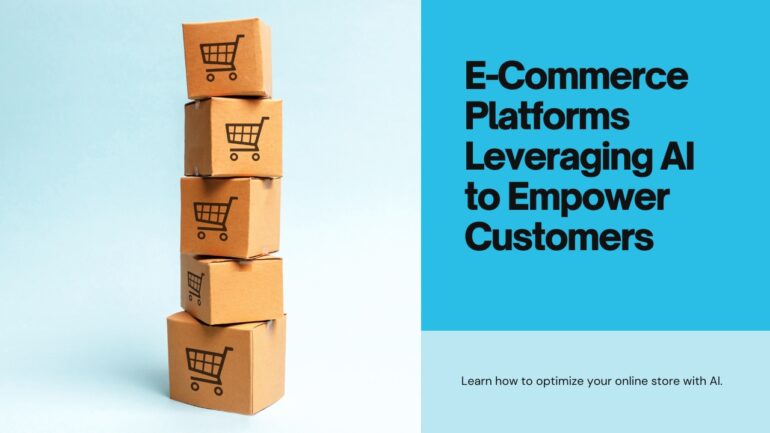Artificial Intelligence has speedily emerged as an actual generation. It’s revolutionizing how we keep.
E-commerce structures use AI to offer extra personalized purchasing reviews, streamline advertising strategies and pricing control procedures, beautify security features, and decorate customer support services.
Amazon’s personalization algorithms examine clients’ purchase histories and seek behaviors to suggest new merchandise, even as Sephora provides virtual make-up advisors. Nike even gives personalized shoe layout features.
Personalized Shopping Experience
Artificial intelligence technology is revolutionizing diverse industries, and eCommerce is no exception.
Companies that embrace AI-powered answers stand to gain an advantage and advantage over their competitors while imparting excellent patron reports.
Artificial Intelligence-powered gear consisting of chatbots and virtual assistants offers real-time customer support by answering queries, resolving issues, and suggesting merchandise.
These assist manufacturers in shopping for both money and time while enhancing user studies.
AI technology like deep mastering, herbal language processing, and laptop vision assist e-trade platforms in automating obligations and streamlining backend procedures while supplying predictive analytics and optimizing pricing techniques to come across fraudsters.
Recommendation engines leverage gadgets’ getting-to-know generation to collect statistics and identify tendencies to create personalized customer recommendations.
This will increase buying confidence, conversion quotes, and common order cost and foster sturdy logo-purchaser relationships that lead to loyalty – such as Nike’s ‘Nike By You’ customization campaign, which allows clients to create customized footwear or Amazon showing customized homepages for millions of online clients.
Chatbots and Customer Service

Ecommerce groups want to be able to reply swiftly to patron comments.
AI can efficiently process big volumes of feedback, analyze sentiment evaluation, and deliver actionable insights – assisting in increasing client satisfaction, loyalty, and income for e-commerce groups.
AI-powered chatbots can provide personalized customer service and an efficient buying experience for clients.
Chatbots can take care of routine and not unusual inquiries with rapid response times, while liberating human assistance to retailers to address more complicated subjects.
Chatbots powered using AI can also help e-commerce organizations decrease cart abandonment by offering assistance and incentives to able customers.
This approach may additionally prove particularly helpful for area-of-interest products with committed customer bases.
AI-powered predictive analytics allow corporations to make records-driven selections based on beyond traits and styles, optimizing inventory control, pricing strategies, and other business approaches to boost operational efficiency – in the end, mainly to lower operational expenses even as competing more efficiently in virtual marketplaces.
Predictive Analytics for Inventory Management
Predictive analytics allow e-trade groups to use income trends and plan stock ranges, helping reduce inventory outs while improving operational performance by decreasing storage fees.
Automated procedures like smart shelves can reveal inventory levels and automatically order products when they become scarce or close to expiration dates.
AI-powered predictive analytics can also assist shops in optimizing pricing techniques.
Zara uses predictive analytics to regulate product charges based totally on purchaser shopping for conduct and social media tendencies, for this reason, supporting lessening stock outs even as keeping purchaser delight.
Predictive analytics powered by synthetic intelligence (AI) can also decorate personal reports by suggesting relevant merchandise to clients and increasing conversion prices.
Furthermore, customized hints create upselling/move-promoting opportunities and improve revenue for organizations.
Dynamic Pricing Strategies

Dynamic pricing techniques utilize AI technology to adjust fees primarily based on actual-time information if you want to maximize revenue.
They don’t forget elements like client buying conduct and styles, competitor costs, delivery and demand fluctuations, seasonality, and more to ensure products are priced optimally in actual time.
Dynamic pricing is right for online businesses because it helps maintain prices aggressively and in step with marketplace situations, drawing in fee-sensitive customers and while rewarding loyalty by presenting incentives or discounts to particular client segments.
One of the primary uses for dynamic pricing in e-commerce is flash income, and restrained-time gives, which can increase engagement and generate sales.
Furthermore, dynamic pricing is used to optimize stock management via adjusting prices of excessive-demand merchandise according to delivery and demand, trying out new products at aggressive costs, or imparting them competitively, so customers can enjoy them firsthand before making buying selections with greater accuracy thanks to AI-powered dynamic pricing algorithms that discover styles for quicker decision-making and increased client satisfaction.
Fraud Detection and Prevention
Artificial Intelligence-powered fraud detection systems use complex algorithms to quickly apprehend anomalous online buying behaviors or signs and symptoms of fraudulent interest and stumble on greater state-of-the-art attacks than conventional rules-primarily based and guide evaluate answers.
These AI answers use diverse gadget learning techniques to quickly examine huge datasets and make computerized decisions on behalf of groups, saving time and resources – helping companies boost operational performance while lowering commercial enterprise costs.
Etsy’s fraud detection device uses personal surfing patterns to detect fraudulent sports like fast browsing excessive-cost objects earlier than sorting out.
If a suspicious consumer is diagnosed, their order will be forwarded immediately to Etsy’s human group for additional assessment and investigation.
E-commerce fraud has become a growing hazard inside the enterprise, as scammers receive cash from retailers, harm their popularity, and threaten patron belief. To counteract those risks, anti-fraud structures must be constantly up-to-date.
Visual Search and Image Recognition
Visual seek era differs from text-based equipment in that it permits clients to locate merchandise by importing a photo of what they’re trying to find, saving effort and time in large marketplaces, which include Etsy or eBay.
AI can automate and optimize commercial enterprise operations by decreasing human exertions and charges.
For example, using AI for stock control reduces stock out danger and complements purchaser pleasure via optimized transport instances and higher aid allocation.
Meanwhile, the call for forecasting permits online organizations to expect product calls, expect seasonal peaks for gold standard supply chain planning functions, avoid overstocking or understocking, and ensure the most appropriate delivery chain-making plans without overstocking or understocking merchandise.
AI-powered pricing optimization tools use device mastering to research consumer statistics and marketplace tendencies to endorse the proper fee for every product, saving eCommerce shops cash and strengthening their aggressive benefits simultaneously.
Furthermore, AI can detect and prevent fraud by studying consumer conduct to discover patterns of fraudulent hobbies – this improves client trust while using up revenue for online outlets.
Recommendation Engines
Recommender engines are system-mastering software program gear that uses algorithms to make product tips for customers.
They accumulate statistics from diverse assets and shop it off their database; the latter should include explicit (inclusive of scores and comments on merchandise) or implicit information with web page views, order history/return history, cart activities, or seek logs.
Recommence engines are helpful to any eCommerce enterprise, as they can boost conversion fees while growing common order values via presenting distinctly applicable product tips to visitors.
As a result, clients are much more likely to purchase items after they feel centered and that their desires are understood through an organization.
This also fosters brand loyalty, which can be important in patron retention.
Recommender engines permit personalized interactions to reduce buying cart abandonment prices and decorate move-selling and upselling possibilities.
If a person purchases an object, their platform may also propose associated accessories or provide them with an upgraded model with greater capabilities.
Ecommerce organizations must preserve thoughts that advice engines can suffer from reputation bias and an exacerbation of present traits, which could restrict publicity of new and area of interest objects.
Furthermore, it could be tough to reap enough records for you to train algorithms of advice structures; furthermore, statistics privacy and safety troubles may prevent their use.
Conclusion
AI generation empowers e-commerce corporations to provide novel patron stories that interact with users while riding a business boom.
This can be executed by streamlining operations and enhancing customer support while driving value efficiency during their cost chains.
AI-powered advice engines use person surfing and purchase history to provide tailored product pointers that meet person options and pursuits, improving move-selling/up-promoting opportunities even as increasing conversion rates.
AI-powered chatbots are also used to assist clients with diverse inquiries and needs, such as monitoring orders, processing returns, answering product or promotional queries, and more.
This reduces human aid expenses while simultaneously meeting consumer inquiries quickly.
AI-powered fraud detection structures use artificial intelligence (AI) to monitor suspicious activities and prevent unauthorized transactions to ensure purchasers agree with and maximize revenue generation.
They additionally optimize actual-time pricing techniques for optimum return in actual time.




